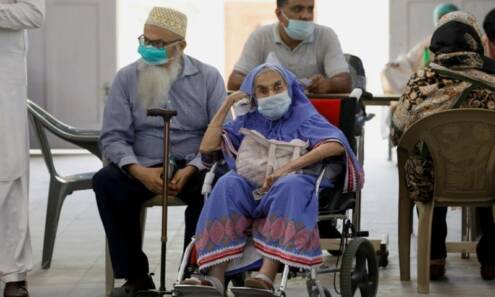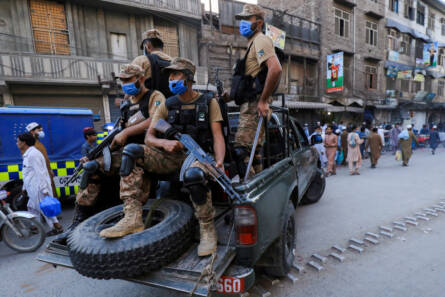Pakistan recorded over 200 COVID-19 deaths in a day for the first time since the start of the pandemic on Tuesday, the government said it was considering stricter lockdowns.
A total of 201 new deaths were recorded on Tuesday. It brings the country’s overall death toll from the virus to 17,530, according to the National Command Operation Center (NCOC). The NCOC oversees the government’s pandemic response. The previous highest daily death count was 157 recorded on April 23.
A total of 5,292 new cases were reported on Tuesday. It also brings the total cases to 810,231 in the country of more than 220 million people.
The national positivity ratio, the number of infections among those tested, was 10.8%. The death rate, the number of infections resulting in fatalities, hit the highest point since the start of the pandemic. It has reached to around 2.2%.
Only around two million vaccinations have been administered in Pakistan. The country has struggled to procure supplies to cover enough of its population.



Officials have said health care facilities are at risk of being overwhelmed. Pakistan has very limited health resources, with ventilators and oxygen in short supply.
Around 631 hospitals treated 6,286 COVID-19 patients on Tuesday. More than 70% of ventilators and oxygenated beds had COVID patients in many cities, according to the NCOC.
Pakistani army troops deployed in 16 major cities
On Monday, Pakistani army troops started working in 16 major cities with high positivity rates. They will assist civilian law enforcement in enforcing measures meant to curb the spread of the coronavirus. Troops will also ensure the wearing of masks in public and the closing of non-essential businesses after 6pm.
Pakistan took stricter measures with lockdowns in a few cities with the highest positivity rates this week due to Covid-19. On Tuesday, Health Minister Faisal Sultan said the same steps could be extended to other areas. He told people to follow social distancing, wearing masks, and other precautionary measures. He added it is important to follow SOPs, especially during Ramadan with the upcoming Eid holiday next month.



“Please keep your Ramadan and Eid simple this year, so we can fight this disease and get through this difficult situation,” Sultan said.
The southern province of Sindh has banned intercity transportation starting April 30. The ban will remain in place through May 17, just after the Eid holiday.
Neighboring country India is also struggling with a health system. A majority of Indian hospitals were full and running out of oxygen. Meanwhile, Edhi Foundation has also offered help to Indian PM Modi with 50 ambulances. Pakistan fears if its citizens will not follow virus SOPs, a similar situation can happen in the country.
What do you think of this story? Let us know in the comments section below.















